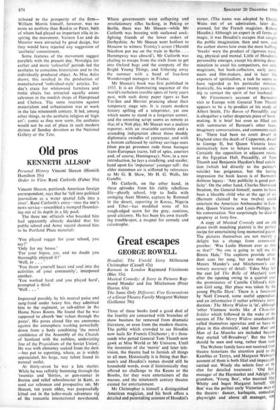Old pros
KENNETH ALLSOP
Personal History Vincent Sheean (Hamish Hamilton 35s) Order to View Rene Cutforth (Faber 30s)
Vincent Sheean, patriarch American foreign correspondent, says that he 'fell into political journalism as a water spaniel falls into a river'. Rene Cutforth's entry—into the BBC'S news service—resembled a mongrel flounder- ing tint of its depth in a lily pool.
The three BBC officials who boarded him had apparently already decided that his public school and Army record showed him to be Portland Place material: 'You played rugger for your school, you say?'
'Only for my house.'
'For your hquse, yes, and no doubt you thoroughly enjoyed it?'
'Well, er . . . '
'You threw yourself heart and soul into the activities of your community', interposed another.
'You worked hard and you played hard', prompted a third.
'Well . . '
Impressed possibly by his neutral poise and sang-froid under heavy fire, they admitted him to the regiment, as sub-editor in the Home News Room. He found that he was supposed to absorb 'BBC values through the pores'. His pores closed like sea anemones against the atmosphere washing powerfully down from a body combining 'the moral confidence of the Assembly of the Church of Scotland with the ruthless, undeviating line of the Praesidium of the Soviet Union'. He was with clemency sacked from the desk —but put to reporting, where, as is widely appreciated, his large, racy talent found its naturl outlet.
At thirty-seven he was a late starter. While he was raffishly bumming through the 'twenties and 'thirties, as gun-runner in Burma and relief schoolmaster in Kent, as used car salesman and prospective MP, Mr Sheean, ten years older, was purposefully kitted out in the tailor-made adventure rig of the romantic international newshound.
Where governments were collapsing and revolutionary rifles barking, in Peking or Berlin, there was Mr Sheean—while Mr Cutforth was boozing with outlawed cock- fighting friends of the lower orders of Derbyshire. As Mr Sheean went hotfoot to Moscow to witness Trotsky's arrest ('Harold Nicolson put me on the train in Berlin . . . Hemingway was aboard'), Mr Cutforth was chafing to escape from the sixth form to get into Oxford bags and the company of the Bright Young Things, and frittering away the summer with a band of free-love Wandervogel teenagers in France.
Mr Sheean's book was first published in 1935. It is an illuminating sequence of the world's turbulent trouble-spots of forty years past, with such dusty paper tigers as Sun Yat-Sen and Herriot prancing about their temporary stage sets. It is recent modern history spilling off a teleprinter, yet one which seems to stand in a forgotten corner, and the unreeling script seems as remote as that of a Noh play. Mr Sheean was a zealous reporter, with an insatiable curiosity and a crusading indignation about those shoddy diplomatic swindles of yesteryear, and with a bottom calloused by railway carriage seats (then pre-jet pressmen rode those baroque trans-European trains, full of spies, couriers and, of course, Hemingway). Now, in a new introduction, he lays a steadying, and staider, hand upon his 'impetuous' younger self: the elder statesman air is stiffened by references to Mr G. B. Shaw, Mr H. G. Wells, Mr Gandhi.
Mr Cutforth, on the other hand, in these episodes from his richly rebellious life—ghastly school, trip to India with swinging Aunt Minnie, capture by Rommel in the desert, reporting in Korea, Nigeria and Tibet—has modified none of his rough-edged scorn for the grey, cautious, good citizenry. He has been his own travell- ing trouble-spot, a magnet for comedy and catastrophe.


































 Previous page
Previous page